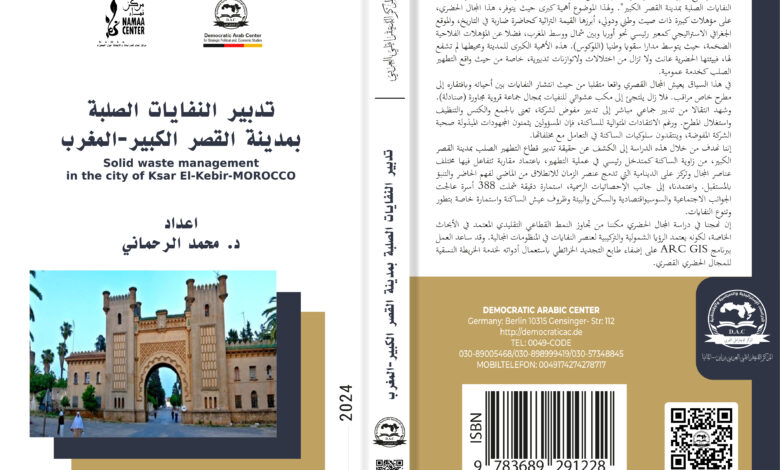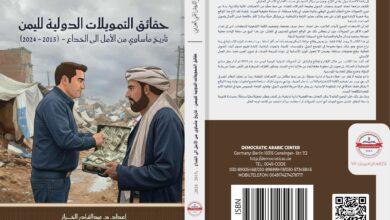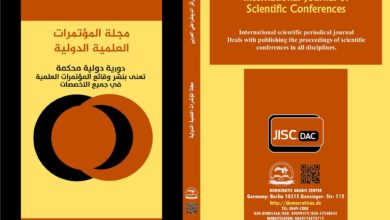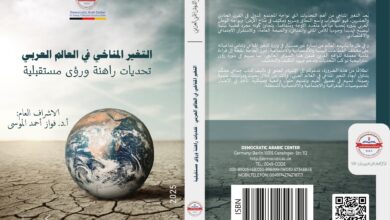تدبير النفايات الصلبة بمدينة القصر الكبير – المغرب
Solid waste management in the city of Ksar El-Kebir-MOROCCO

تأليف : د. محمد الرحماني – المغرب
نسخة “pdf”-
تدبير النفايات الصلبة بمدينة القصر الكبير – المغرب
الطبعة الأولى “2025″ –من كتاب : تدبير النفايات الصلبة بمدينة القصر الكبير – المغرب
جميع حقوق الطبع محفوظة #المركز_الديمقراطي_العربي ولا يسمح بإعادة إصدار هذا الكتاب أو اي جزء منه أو تخزينه في نطاق إستعادة المعلومات أو نقله بأي شكل من الأشكال، دون إذن مسبق خطي من الناشر .
تقديم : –
ارتبط موضوع أطروحتنا للدكتوراه في الجغرافيا بحقل الجغرافيا الحضرية البيئة والتنمية، تحت عنوان “ تدبير النفايات الصلبة بمدينة القصر الكبير”. ولهذا الموضوع أهمية كبرى حيث يتوفر، هذا المجال الحضري، على مؤهلات كبيرة ذات صيت وطني ودولي، أبرزها القيمة التراثية كحاضرة ضاربة في التاريخ، والموقع الجغرافي الاستراتيجي كمعبر رئيسي نحو أوربا وبين شمال ووسط المغرب، فضلا عن المؤهلات الفلاحية الضخمة، حيث يتوسط مدارا سقويا وطنيا (اللوكوس). هذه الأهمية الكبرى للمدينة ومحيطها لم تشفع لها، فبيئتها الحضرية عانت ولا تزال من اختلالات ولاتوازنات تدبيرية، خاصة من حيث واقع التطهير الصلب كخدمة عمومية.
في هذا السياق يعيش المجال القصري واقعا متقلبا من حيث انتشار النفايات بين أحيائه وبافتقاره إلى مطرح خاص مراقب. فلا زال يلتجئ إلى مكب عشوائي للنفيات بمجال جماعة قروية مجاورة (صنادلة). وشهد انتقالا من تدبير جماعي مباشر إلى تدبير مفوض لشركة، تعنى بالجمع والكنس والتنظيف واستغلال المطرح. ورغم الانتقادات المتوالية للساكنة، فإن المسؤولين يثمنون المجهودات المبذولة صحبة الشركة المفوضة، وينتقدون سلوكيات الساكنة في التعامل مع مخلفاتها.
إننا نهدف من خلال هذه الدراسة إلى الكشف عن حقيقة تدبير قطاع التطهير الصلب بمدينة القصر الكبير، من زاوية الساكنة كمتدخل رئيسي في عملية التطهير، باعتماد مقاربة تتفاعل فيها مختلف عناصر المجال وتركز على الدينامية التي تدمج عنصر الزمان للانطلاق من الماضي لفهم الحاضر والتنبؤ بالمستقبل. واعتمدنا، إلى جانب الإحصائيات الرسمية، استمارة دقيقة شملت 388 أسرة عالجت الجوانب الاجتماعية والسوسيواقتصادية والسكن والبيئة وظروف عيش الساكنة واستمارة خاصة بتطور وتنوع النفايات.
إن نهجنا في دراسة المجال الحضري مكننا من تجاوز النمط القطاعي التقليدي المعتمد في الأبحاث الخاصة، لكونه يعتمد الرؤيا الشمولية والتركيبية لعنصر النفايات في المنظومات المجالية. وقد ساعد العمل ببرنامج ARC GIS على إضفاء طابع التجديد الخرائطي باستعمال أدواته لخدمة الخريطة النسقية للمجال الحضري القصري.
Résumé
Le sujet de notre thèse de doctorat en géographie est lié au domaine de la géographie urbaine, de l’environnement et du développement, sous le titre “La gestion des déchets solides dans la ville de Ksar El Kébir”. Ce sujet revêt une grande importance, car cette zone urbaine possède de grandes potentialités ayant une renommée nationale et internationale, parmi lesquelles la valeur patrimoniale en tant que ville historique, son emplacement géographique stratégique en tant que passage principal vers l’Europe et entre le nord et le centre du Maroc, ainsi que ses vastes potentialités agricoles, étant située au cœur d’un grand bassin d’irrigation national (le Loukos). Cette grande importance de la ville et de ses environs n’a cependant pas suffi, car son environnement urbain a souffert et continue de souffrir de déséquilibres dans sa gestion, notamment en ce qui concerne la gestion des déchets solides en tant que service public.
Dans ce contexte, la région de Ksar El Kébir vit une situation instable en matière de gestion des déchets, avec une propagation des déchets entre ses quartiers et l’absence de décharge surveillée spécifique. Elle continue de recourir à une décharge sauvage située dans la commune rurale voisine (Snadla). Il y a eu une transition de la gestion directe par la commune à une gestion déléguée à une entreprise, responsable de la collecte, du nettoyage et de l’exploitation de la décharge. Malgré les critiques constantes des habitants, les responsables valorisent les efforts fournis en collaboration avec l’entreprise délégataire, tout en critiquant les comportements des habitants vis-à-vis de leurs déchets.
À travers cette étude, notre objectif est de révéler la réalité de la gestion du secteur des déchets solides à Ksar El Kébir, du point de vue des habitants, en tant qu’acteurs principaux dans le processus de gestion, en adoptant une approche dynamique qui prend en compte l’interaction des différents éléments de l’espace et met l’accent sur une analyse qui intègre le facteur temps, afin de partir du passé pour comprendre le présent et anticiper l’avenir. En plus des statistiques officielles, nous avons utilisé un questionnaire détaillé couvrant 388 foyers, abordant les aspects sociaux, socio-économiques, le logement, l’environnement et les conditions de vie des habitants, ainsi qu’un questionnaire spécifique sur l’évolution et la diversité des déchets.
Notre approche de l’étude de l’espace urbain nous a permis de dépasser le modèle sectoriel traditionnel utilisé dans les recherches spécifiques, en adoptant une vision globale et intégrée des déchets au sein des systèmes spatiaux. L’utilisation du programme ARC GIS a permis d’apporter une dimension innovante à la cartographie en utilisant ses outils pour produire une carte systémique de l’espace urbain de Ksar El Kébir.
Abstract
The topic of our doctoral dissertation in geography is related to the field of urban geography, environment and development, which is titled ” Solid waste management in the city of Kasr el-Kebir “. This topic is of great importance as this urban area possesses great qualifications of national and international renown, most notably its heritage value as a historical metropolis, and the strategic geographical location as a main crossing towards Europe and between northern and central Morocco, as well as its huge agricultural potentials, since it is located in the center of a national irrigation orbit (Loukos). Despite the great importance of the city and its surroundings, Ksar El-Kebir is still underestimated as its urban environment has suffered from distortions and administrative imbalances, especially in terms of the reality of solid waste management as a public service.
In this context, Ksar El Kebir city suffers from an unstable reality manifested in the phenomenon of littering in its neighborhoods and the lack of a dedicated landfill. The city resorts to a makeshift landfill in the neighboring town of (Snadla). It witnessed a transition from a direct collective management to a delegated management by a company concerned with collecting, sweeping, cleaning and exploiting the landfill. Despite the constant criticism of residents, the officials appreciate the efforts made by the authorized company and criticize the behavior of the residents in dealing with its waste.
This study aims at revealing the reality of managing the sector of solid waste treatment in the city of Ksar El-Kebir, from the viewpoint of the residents as a major party in the process of waste management, by adopting a systemic approach in which the various elements of the field interact and focus on the dynamic that integrates the element of time, starting from the past to understand the present and predict the future. In addition to official statistics, we adopted an accurate form that included 388 families. The form dealt with social and socio-economic aspects, housing, the environment, and the living conditions of the population, and a special form on the development and diversity of waste.
This approach to studying the urban field has enabled us to go beyond the traditional sectoral pattern adopted in private research, as it adopts a comprehensive and synthetic vision of the waste component in spatial systems. The work of the ARC GIS program has helped to give the character of cartographic renewal by using its tools to serve the layout map of the urban space.
الناشر: المركـز الديمقراطي العربي للدراسات الاستراتيجية والسياسية والاقتصادية – ألمانيا – برلين
Democratic Arabic Center- Berlin – Germany





